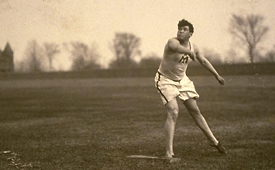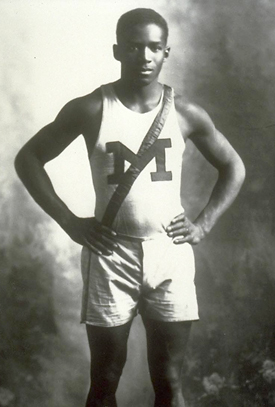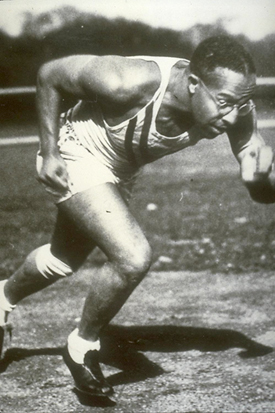Related stories:
• Diving Olympian Micki King’s redemption >
• Roommates, gymnasts among U-M athletes competing in 2012 Olympics >
• More on Michigan athletes throughout the history of the Olympics >
In 1908, King Edward VII of Great Britain, eldest son of Queen Victoria, was the most powerful man in the world, for he ruled a great empire.
And as the king surveyed the athletes parading past his reviewing stand to open the Olympic Games that year, it was expected that each country’s standard-bearer would dip his nation’s flag to honor the monarchy.
But U-M shot-putter Ralph Rose, who was the first Olympian to carry the flag on behalf of the United States team, was having none of that.
“ ‘This flag dips for no earthly king’ is the quote that was attributed to him,” says Greg Kinney, associate archivist at the U-M Bentley Historical Library. “For many years that became an American tradition,” one that continues today.
Since 1900, more than 200 Michigan students and coaches have participated in the Summer and Winter Olympic Games, representing the U.S. and 23 other countries. As the Olympics return to London this summer, 26 current or former athletes and their coaches will be on hand for the competition.



Shot-putter Ralph Rose of the U-M track team was the first Olympian to carry the flag on behalf of the United States team. Rose established an American tradition in 1908 when he refused to dip the flag before King Edward VII of Great Britain, reportedly saying, “This flag dips for no earthly king.” Photo courtesy Bentley Historical Library.
William DeHart Hubbard was the first African American to win a gold medal in an individual Olympic event. Photo courtesy Bentley Historical Library.
Eddie Tolan is one of three Wolverines to win both the 100- and 200-meter races in one Olympic year. Photo courtesy Bentley Historical Library.
The history of U-M and the Olympics is partly a story of defiance — not only of monarchs but also of odds. It’s also a story of singular success and redemption. Michigan athletes have won 65 gold medals, 35 silver medals and 38 bronze medals. Based on overall performance, the university would qualify as the 19th most successful country in the history of the Olympics.
Former U-M volunteer assistant coach Michael Phelps trained at U-M for the 2008 Beijing Games and won a record-setting eight gold medals in swimming to set an Olympic record for individual accomplishment. Other U-M Olympians have achieved multiple gold medal Olympic victories, as well.
“We have three sprinters, Archie Hahn in 1904, Ralph Craig in 1912 and Eddie Tolan in 1932 – who in one year won both the 100- and 200-meter races,” Kinney says. “Few other people have done it. We’re the only university with three.”
Another U-M standout Olympic athlete is William DeHart Hubbard, the first black American to win a gold medal in an individual Olympic event. Hubbard, by his junior year, had won Big Ten crowns in the 100-yard dash and the long jump, and made the U.S. Olympic team for the 1924 Paris Olympics.
After making the long jump finals, DeHart trailed as he started down the runway for his final jump. In stride and gaining speed, he hit the takeoff board well and landed at 24 feet, 5-and-a-half inches, well beyond the field of challengers, and into the international limelight.
Michigan’s first female Olympian — and gold medalist — was swimmer Joan Spillane in the 1960 Games. She won a gold medal in the 4×100-meter freestyle relay. Former U-M swim coach Gus Stager, who was head of the U.S. swim team that year, saw Spillane become the first U-M woman gold medal winner as leadoff swimmer. Stager coached 21 U-M Olympians who won six gold and seven bronze medals.
Former U-M Athletic Director Bill Martin, who served as president of the U.S. Olympic Committee in 2002-04, points out that President Gerald Ford, a U-M alumnus, had a significant impact on our nation’s role in the modern Olympics Games.
After the U.S. performed below expectations at the 1976 Olympics in Montreal, Ford formed the President’s Commission on Olympic Sports. It recommended that a central organization could better coordinate amateur sport in the United States. Congress subsequently passed legislation that designated the U. S. Olympic Committee as head of amateur sports development.
Martin says the main thrust of his service on the USOC was reorganizing and streamlining the organization.
“It wasn’t that hard to run the Olympic Committee out of a cell phone from State and Hoover (streets in Ann Arbor); I’d fly to Colorado Springs one day every two weeks,” he says, in the months leading to the 2004 Summer Games in Athens.
“We did everything from financial to organizational reviews to personnel to dealing with performance drug challenges to fielding the team that represented the U.S. in Athens that won over 100 medals. It’s always an honor to serve your country in that capacity,” he says.

